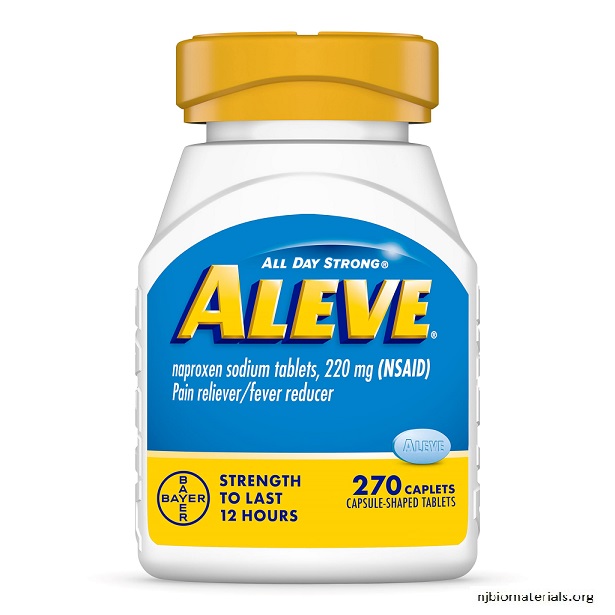Aleve (Naproxen)
What is Aleve
Aleve, which is also commonly referred to as Aleve, is a nonsteroidal anti-inflammatory medication (NSAID) that is given to patients in order to alleviate pain, swelling, and fever. It is frequently considered necessary for the treatment of conditions such as arthritis, menstrual discomfort, and other types of acute pain.
Recommendations
Follow the dose directions advised by your doctor. The usual starting dosage for individuals seeking pain relief is 500 mg initially, then 250 mg every 6 to 8 hours as needed; a maximum daily dosage not exceeding 1,250 mg on the first day and 1,000 mg afterward.
Administration: To assist reduce stomach pain, use Aleve (Naproxen) with food or milk. Don't crush or chew; swallow the tablet whole with water.
Keep yourself sufficiently hydrated throughout treatment.

Precautions and Contraindications
● They are contraindicated in those known to be hypersensitive to naproxen or another NSAID and allergic reactions. People who have asthma, urticaria, or allergic-type reactions to aspirin or another NSAID may have a higher risk of adverse reactions.
● Gastrointestinal Problems: Naproxen raises the risk of gastrointestinal bleeding and ulcers, so people with a history of gastrointestinal problems should be careful.
● Particularly with long-term usage or in those with pre-existing cardiovascular diseases, cardiovascular risk may rise and include significant occurrences like heart attacks and strokes.
● Use carefully in patients with renal or hepatic damage to kidney and liver function. Regular surveillance could be required.
● Pregnancy and Breastfeeding: Avoid use during the third trimester of pregnancy. Unless very necessary, Aleve (Naproxen) should be avoided in the first and second trimesters; it is eliminated in breast milk; hence, see a doctor before use.
Interactions
● Anticoagulants: If taken with anticoagulants (like warfarin), you run more chances of bleeding.
● Avoid simultaneous usage with other NSAIDs or salicylates since the higher risk of gastrointestinal side effects results from them.
● Diuretics: They may lower their efficacy and raise the risk of kidney-related side effects.
● ACE Inhibitors and ARBs: Track blood pressure; may lessen their effectiveness in lowering blood pressure.
● Lithium: Aleve can raise lithium levels, which calls for monitoring of lithium concentrations.
● Methotrexate increases the risk of toxicity; concomitant usage calls for cautious monitoring.
Side Effects
● Typical side effects include nausea, headache, dizziness, stomach trouble, and abdominal pain. Drowsiness is another.
● Gastrointestinal bleeding, peptic ulcers, renal damage, liver malfunction, and cardiovascular events—heart attacks and strokes—are among the severe side effects.
● Allergies: Should symptoms including rashes, swelling, or trouble breathing demand quick medical attention,
● Rarely, severe skin responses, including Stevens-Johnson syndrome, can develop; stop using if symptoms of a skin rash or other severe reaction show.
Before You Start Aleve Treatment
● Talk about your whole medical history, including any allergies and any present drugs—prescription, over-the-counter, supplements).
● Your doctor might do a physical examination to determine whether naproxen is appropriate and necessary for your ailment.
● Routine monitoring could be advised, particularly if naproxen is taken long-term.
Overdose
● An overdose might produce symptoms like nausea, vomiting, gastrointestinal bleeding, disorientation, sleepiness, and perhaps significant medical consequences.
● If an overdose is suspected, get proper medical assistance. Treatment mainly emphasizes treating symptoms as needed and supportive actions.
Conclusion
Despite the fact that Aleve (Naproxen) is a medication that is widely used and effective for treating pain and inflammation, it is not without risks that require careful consideration and strict adherence to guidelines in order to ensure safe use. Prior to beginning treatment, it is imperative that you always consult a healthcare professional.